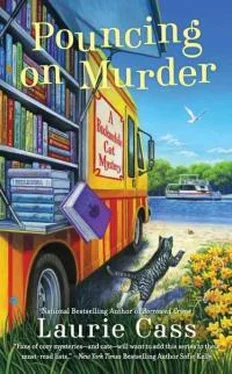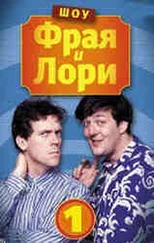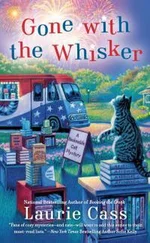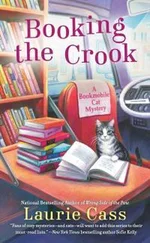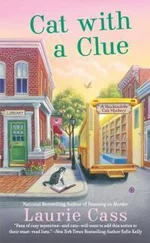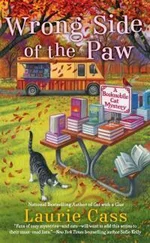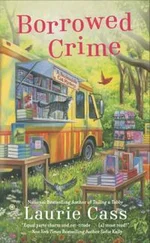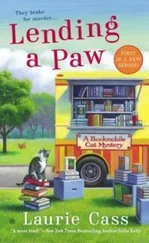By the time I dragged myself home it was long past dark, and only the knowledge that if I didn’t eat something, I might faint dead away on the sidewalk and become an object at which people pointed and murmured vague comments about “How sad, she had so much potential” sent me into Fat Boys Pizza for the sustenance of a sub sandwich. Heavy on the protein, ma’am.
Eddie and I and a fresh copy of Alan Bradley’s latest Flavia de Luce mystery went to bed early, and we woke up to a bookmobile day of stiff winds and fast-moving clouds.
When I lifted the cat carrier out of my car for transportation to the bookmobile, a sharp wind gust filled the carrier and twisted me around.
“MrrrRRRrrr!”
“Sorry about that,” I said. “It’s just that kind of a day.”
But it wasn’t, not really. Because as soon as Julia came aboard and we were rolling deep into the eastern part of Tonedagana County, the clouds parted and the sun came out.
Julia, though she was a Tony award–winning actress, was not on anyone’s list of quality singers. That, however, didn’t keep her from singing the song from the musical Annie , the one where the little girl is betting her last dollar that the sun will shine the next day.
When she paused for breath, I asked, “Are you sure you want to do that?”
“Do what?”
“This is northwest lower Michigan. Are you sure you want to bet any money, let alone your last dollar, that the weather forecasters are accurate?”
Julia grinned. “Now, Ms. Hamilton, you know perfectly well the song is a metaphor. It’s about being optimistic, about looking on the bright side of life. What’s so funny?”
I shook my head, trying to get rid of the image from the last scene of Monty Python’s Life of Brian . “Metaphor, shmetphor. All I care about right now is finding a Ross Weaver replacement. How can the book fair possibly be a success if—” I blinked at the sight in front of me.
“Minnie?” Julia asked. “Are you okay?”
“Um, sure.” I gave my eyes a quick rub but was still seeing what I thought I’d seen. We were approaching Peebles. With a population of less than a thousand, Peebles had a retail district of a block and a half and was primarily known for its outstanding diner-style restaurant.
And right in front of my eyes was Mitchell Koyne, walking into the restaurant next to the same woman I’d seen him with on my trip back from Alpena.
“Do you see that?” I asked Julia, tipping my head Mitchell-ward. “Do you know who that is?”
Julia squinted. “It looks like Bianca Sims. She’s a real estate agent. Out of Petoskey, I think. Don’t know the gentleman. He’s a tall one, isn’t he? Do you know him?”
“Oh, yes,” I said, grinning inside and out. “I do indeed.”
And the last of my mostly self-induced stress about the book fair vanished. How could I ever have thought, even in jest, about changing jobs? Everything would work out, one way or another. Either people would show up or people wouldn’t, and all I could do was my best.
Plus, out here on the bookmobile, I came across things like this, seeing Mitchell Koyne, of all people, holding hands with a real-live successful professional woman. How could life get any better?
• • •
The second half of the day took us close to the area where I’d followed Mitchell’s truck, which meant we were nearing Neva Chatham territory. I told Julia about the incident, and she made sympathetic noises, reassuring me that my reaction to a gun pointed in my general direction hadn’t been over-the-top. However, she didn’t know anything about the eccentric Ms. Chatham and wasn’t sure she knew anyone who did.
“We’re in the opposite corner of the county from Chilson,” she said, a little apologetically. “I don’t know many people over here.”
So when the first group of bookmobilers came on board that afternoon, I started asking around, in a sideways sort of way. The first person I asked was a tailored elderly gentleman whom I might have wanted to introduce to my aunt if she hadn’t already been seeing Otto.
“Neva Chatham,” he said, smoothing his white mustache. “John Chatham’s daughter?”
I had no idea, but there couldn’t be many people walking around with the first name of Neva. “She lives in an old farmhouse out on Chatham Road.”
“That’s right,” my gentleman said. “John and Marie’s daughter. Only child, if I recall correctly.” He got a faraway look in his pale blue eyes. “They were good people. Sad, really, what happened.”
“Oh?” I asked. “What’s that?”
He shook his head, clearing away the memories. “What happens to all of us. We get old, we get sick, and we die.” He smiled, taking away the brutishness of his statements. “Don’t mind me, I can get a little maudlin in April. It’s the weather, you know.”
I blinked at him. It was the first of May, and the weather had turned sunny and bright and close to downright warm. But April can hang on inside you, so I knew what he meant.
At the next stop, I asked Mrs. Dugan, a patron I knew to be chatty, about Neva.
Mrs. Dugan sighed and shook her head, her white curls staying in place with steadfast firmness. “I worry about her, I really do. All alone in that big house with no one to talk to. She doesn’t even have cable television.”
“I heard she was an only child.”
She nodded. “That’s right. Doted on her father. Not sure she ever left home, especially after he got sick. Then he died and her mother just faded away, if you know what I mean.”
“How old was Neva?” I asked.
“When her dad got sick? Goodness, I really don’t know. I was just a little girl at the time, so she was probably somewhere in her twenties. And the poor man lingered so.” Mrs. Dugan sighed. “Probably lasted twenty-five years. Thinking back on it, he probably had multiple sclerosis. So little they can do about it now, and back then there was nothing.”
Which meant Neva was around fifty when her father died. She’d spent the most productive years of her life caretaking her father, then her mother, and never had a life of her own. No husband, no children, and now no grandchildren.
Mrs. Dugan was still talking, so I tuned back in. “How Neva managed to take care of her parents and run that farm I’ll never know. The place has been in her family since homestead days, so I doubt there’s a mortgage, but the property taxes alone must eat her alive.”
Property taxes. Yet another reason to put off buying a house. “It’s a working farm?” I asked.
“If you want to call it that.” Mrs. Dugan half laughed. “She has a few dairy cows and runs a summer farm stand, selling fruits and vegetables. Raises quite a variety, Neva does, with that greenhouse her granddad made. Gets strawberries before anyone else in the county.”
“She does this all by herself?”
Mrs. Dugan shrugged. “Must be. Makes jams and jellies, too. Gets a pretty penny for them, I’ll say that for her.”
But I was stuck back on the idea that Neva was all alone in her endeavors. “What about her other family, and her friends? What about neighbors? Do they help her? Farming is hard work, and . . .”
Mrs. Dugan was shaking her head. “Help Neva Chatham? I wouldn’t risk offering, not if my life depended on it. And honestly I’m not sure she has friends, not to speak of.”
There was a tug at my pant leg. I looked down and saw a small child looking up at me. He was maybe four years old with jet-black hair, big brown eyes, and the longest eyelashes I’d ever seen on a human. “Hi,” I said. “May I help you?”
He nodded. “Miss Neva is my friend.”
“She is?”
Again he nodded. “My mommy takes me to get raspberries. Miss Neva helps me pick the best ones.”
Читать дальше
